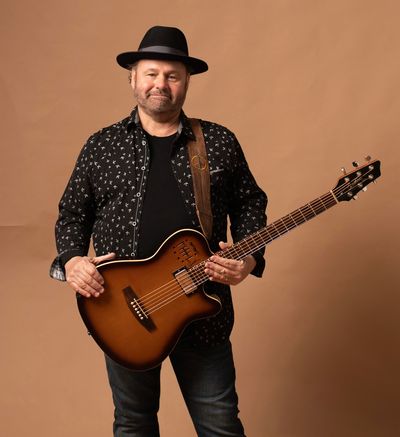How does a folkie top belting out a Dio classic at the Knitting Factory when he returns?

Martin Sexton lives in the moment and his songs and performances reflect that approach.
Just prior to taking the stage at the Knitting Factory in May 2010, Sexton learned that legendary vocalist Ronnie James Dio had died from cancer.
“I remember playing Spokane the night Ronnie James Dio passed,” Sexton said. “We opened the show with (Dio’s) ‘Rainbow in the Dark’ and the crowd sang along. It was such a powerful moment that I’ll never forget.”
A folk singer inspired to belt out a metal classic made for an unforgettable concert experience.
While in lockdown during the summer of 2020, Sexton captured the moment with his latest album, “2020 Vision.” Sexton, who will perform Tuesday at Lucky You Lounge, peered out at a divided America from within the confines of a house united by his family.
“It was a scary time but here at home I enjoyed the rare opportunity to be with my family non-stop,” Sexton said. “So the songs were written almost like a scrapbook of that time trying to keep an optimistic view during an otherwise dark time.”
“2020 Vision,” which is Sexton’s first release since 2015’s “Mixtape of the Open Road,” features Sexton’s take on America. It’s a nice bookend to his 1998 album, “The American,” which is the cerebral singer-songwriter’s view during his days with a major label, Atlantic.
“America is a unique and amazing place,” Sexton said. “There really is no country like it.”
Sexton, 56, who is optimistic about the future, is about bringing people together. “Unity is my mission,” Sexton said. “I’m honored to be a messenger of such a powerful unifying force as music. I love looking out to the crowd and seeing folks of all kinds singing with me. It’s the little changes that we do that matter.”
The Syracuse, New York native, who started his career busking in the streets of Boston a generation ago, is working on new tunes. Unlike some of his peers, Sexton can write in any situation.
“My songwriting process is all over the place,” Sexton said. “It can be anywhere from sitting in the middle of a lake in a canoe to being behind the steering wheel of my truck. Or maybe even right in front of the microphone in the studio for the last-minute change of a line.”
Anything goes with Sexton’s songwriting and the same can be said for the Americana artist in concert.
“I very rarely use a set list,” Sexton said. “Spontaneity rules as the fans shout out tunes from the crowd. It brings a sense of immediacy and uniqueness to every show. Nobody knows including myself where the performance will go. But it’s always an inclusive concert.”
There have been a number of ups and downs for Sexton during his 30-year career but the recording artist, who was given the National Academy of Songwriters Artist of the Year Award in 1994, is thankful to have stability thanks to his loyal fan base.
“My career has ebbed and flowed through the decades and I feel so blessed to have an audience who keeps coming back and bringing their friends and family along,” Sexton said. “I still meet folks who saw me way back in the streets of Harvard Square and they’ve been with me ever since.”
It’s been 20 years since Sexton decided to leave Atlantic to become an independent artist. “I got a little boost from Atlantic,” Sexton said. “After leaving the major label I put out my double live album, (2000’s “Live Wide Open.”) which funded my little imprint and sent me on my course as an independent artist, which brought me some of the best years ever. Hey, Atlantic was great, they let me make the records I wanted to make and even produce the second one myself (2000’s “Wonder Bar”). But after that I figured out that I didn’t need the big guns to reach the fans so I opted out in 2002 and went indie and I haven’t looked back since.”